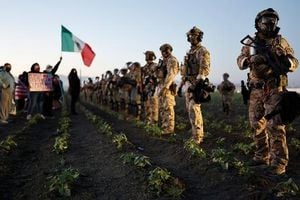Across Europe, a political storm is brewing as governments and parties grapple with the question of how to respond to anti-fascist activism. In a move that has drawn fierce criticism from civil liberties advocates, the Dutch parliament took a decisive step on September 19, 2025, by requesting its government to classify Antifa—a loosely organized coalition of anti-fascist activists—as a terrorist organization. This development follows closely on the heels of U.S. President Donald Trump’s announcement just a day earlier, on September 18, that he intended to designate Antifa as a terrorist group in the United States. The ripple effect has been swift and far-reaching, with Hungary and Belgium signaling their intention to follow suit, and Germany’s influential Alternative for Germany (AfD) party amplifying similar calls.
According to DiEM25, the Dutch parliament’s move marks a fundamental shift from a technical-legal debate to what critics describe as a “frontal assault on democracy.” The publication argues that labeling Antifa as a terrorist organization is not just about security, but about “silencing resistance” and threatening the very rights that underpin democratic societies. “Antifa is not a tightly run organisation with a headquarters, membership list, and central leadership. It is a collective name for people who refuse to passively watch as the far right marches forward. Anti-fascism is not a crime – it is a moral duty,” the piece asserts, capturing the passion behind the resistance to these political maneuvers.
The Dutch move was spearheaded by right-wing politician Geert Wilders of the Party for Freedom (PVV) and supported by the ruling People’s Party for Freedom and Democracy (VVD), a party that counts NATO Secretary General Mark Rutte among its members, as reported by harici.com.tr. The parliamentary request has sparked alarm among activists and legal experts, who warn that criminalizing anti-fascist organizing under terrorism laws risks ushering in a “police state” climate. They argue that such measures could undermine basic democratic rights, including freedom of assembly and speech, and set a dangerous precedent that might soon be used against other activist groups, such as climate protesters or any citizens challenging the status quo.
The debate is by no means confined to the Netherlands. Hungarian Prime Minister Viktor Orbán, a staunch ally of Trump on the European stage, stated on September 20, “The time has come in Hungary to classify organizations like Antifa as terrorist groups, following the American model.” This declaration was made just one day after the Dutch parliamentary vote, signaling a coordinated rightward shift among certain European leaders. In Belgium, Georges-Louis Bouchez, president of the ruling Reformist Movement (MR), echoed these sentiments, calling for the official dissolution of Antifa and accusing the group of “using fascist methods.”
Meanwhile, Germany’s AfD is seizing the moment to push its own agenda. The party, which has seen a surge in popularity throughout September 2025, surpassed the CDU/CSU for the first time in a YouGov poll published on September 17, and again in an INSA poll on September 20, with 27% and 26% support, respectively. Local elections in North Rhine-Westphalia on September 15 saw AfD candidates advance to the second round of mayoral elections in Duisburg, Gelsenkirchen, and Hagen, scheduled for September 21. AfD politicians have long called for the classification of Antifa as a terrorist organization, and party members such as Alexander Wolf and Dario Seifert have publicly endorsed Trump’s initiative, with Wolf declaring, “Donald Trump wants to take action against Antifa. … Very good!”
The AfD’s growing influence is reshaping the German political landscape, with some in the CDU and CSU reportedly reconsidering their traditional refusal to cooperate with the far-right party. According to Frankfurter Allgemeine Zeitung, even some leading figures within these mainstream conservative parties now privately acknowledge that the AfD cannot be ignored, at least in matters such as committee assignments. The firewall that once separated the AfD from coalition politics appears to be cracking, as evidenced by comments from CDU board member Carina Hermann and the lack of outright rejection from Social Affairs Minister Karl-Josef Laumann regarding potential AfD-supported majorities in the Bundestag.
The rightward shift is not limited to anti-fascist policy. The AfD is also embroiled in an internal debate over the reintroduction of compulsory military service, a long-standing party demand. On September 9, 2025, the parliamentary group’s working group leaders approved a motion to reinstate conscription, but opposition from the party’s eastern regional associations—especially Thuringia and Saxony-Anhalt—forced the issue back into internal consultation. The eastern leaders insist that “the deployment of soldiers in foreign wars must be excluded,” reflecting anxieties about German involvement in the Ukraine conflict and fears of being drawn into “proxy wars” for foreign interests. Party co-chairman Tino Chrupalla has repeatedly argued against conscription during the ongoing war in Ukraine, a stance that resonates with the AfD’s peace-oriented image in eastern Germany but is viewed with skepticism in the west.
The debate over conscription has been simmering since 2023, with the party alternately including and removing the demand from its election programs. In October 2024, the federal program commission, with Chrupalla’s support, decided to drop the demand, but a subsequent member survey showed overwhelming grassroots support for its reinstatement. The issue remains unresolved, with party leader Alice Weidel stating that while AfD supports conscription, “this is not an effective way to prevent German soldiers from being misused to serve in Ukraine.” The parliamentary group is expected to make a final decision in the coming weeks.
The European rightward drift is being actively encouraged by figures in the United States. On September 13, 2025, Elon Musk, former Trump advisor and tech magnate, addressed a far-right march in London attended by nearly 150,000 people. In his video message, Musk called for the dissolution of the British parliament and warned, “It’s up to you whether you resort to violence, but violence is at your door. You either fight back or you die, that’s the reality.” Such rhetoric is fueling fears of escalating political violence and a breakdown of democratic norms on both sides of the Atlantic.
Opponents of the push to criminalize Antifa warn that it represents a dangerous inversion of reality. As DiEM25 puts it, “To label anti-fascism as terrorism is to take sides. It means the state invests more energy in criminalising those who resist hatred and oppression than in combating hatred and oppression itself.” The concern is that today’s target—Antifa—could soon expand to include climate activists, journalists, or any group that challenges those in power. The specter of a democracy that brands its critics as terrorists is, for many, a step too far.
The coming weeks and months will reveal whether these moves are the beginning of a broader European trend, or whether the backlash from civil society and political opposition will halt the momentum. For now, the debate over how to balance security, civil liberties, and the right to resist remains fiercely contested, with the future of European democracy hanging in the balance.




